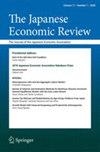银行贷款给陷入财务困境的公司会带来创新吗?
IF 0.5
4区 经济学
Q2 ECONOMICS
引用次数: 3
摘要
本研究考察了银行贷款给陷入财务困境的企业与技术创新之间的关系。利用基于韩国制造业企业层面创新和银行贷款的综合数据集的probit模型估计,我们首先发现,银行贷款给激励机制薄弱的陷入困境的企业对创新没有或只有很小的影响。其次,当公司有一个强有力的基于激励的薪酬制度时,可以观察到对创新的有益影响。第三,财务困难且激励机制较强的企业追求的是产品创新,而不是流程创新。融资越稳定,企业的创新绩效越强。本文章由计算机程序翻译,如有差异,请以英文原文为准。
Do Bank Loans To Financially Distressed Firms Lead To Innovation?
This study scrutinizes the association between a bank loan to a financially distressed firm and technological innovation. Using probit model estimations based on a comprehensive Korean manufacturing firm-level data set on innovation and bank loans, we first find that a bank loan to a troubled firm with a weak incentive system has no or little effect on innovation. Second, beneficial effects on innovation are observed when the firm has a strong incentive-based pay system. Third, financially distressed firms with strong incentive systems pursue product innovation rather than process innovation. Finally, the innovation performance of these firms strengthens with more stable financing.
求助全文
通过发布文献求助,成功后即可免费获取论文全文。
去求助
来源期刊

Japanese Economic Review
ECONOMICS-
CiteScore
2.70
自引率
0.00%
发文量
15
期刊介绍:
Started in 1950 by a group of leading Japanese economists under the title The Economic Studies Quarterly, the journal became the official publication of the Japanese Economic Association in 1959. As its successor, The Japanese Economic Review has become the Japanese counterpart of The American Economic Review, publishing substantial economic analysis of the highest quality across the whole field of economics from researchers both within and outside Japan. It also welcomes innovative and thought-provoking contributions with strong relevance to real economic issues, whether political, theoretical or policy-oriented.
 求助内容:
求助内容: 应助结果提醒方式:
应助结果提醒方式:


